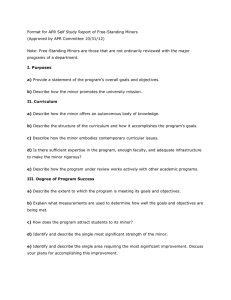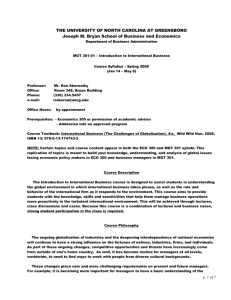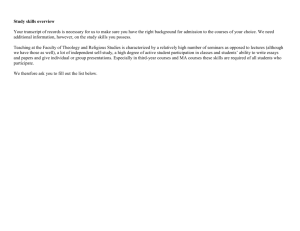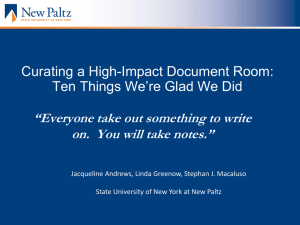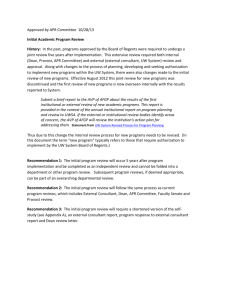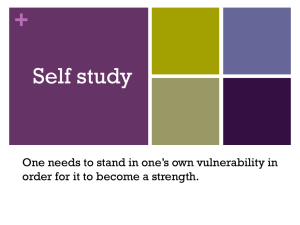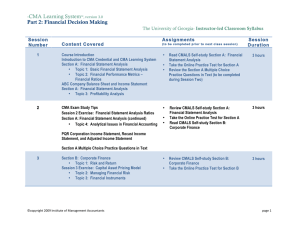Course Outline - University of San Diego Home Pages
advertisement
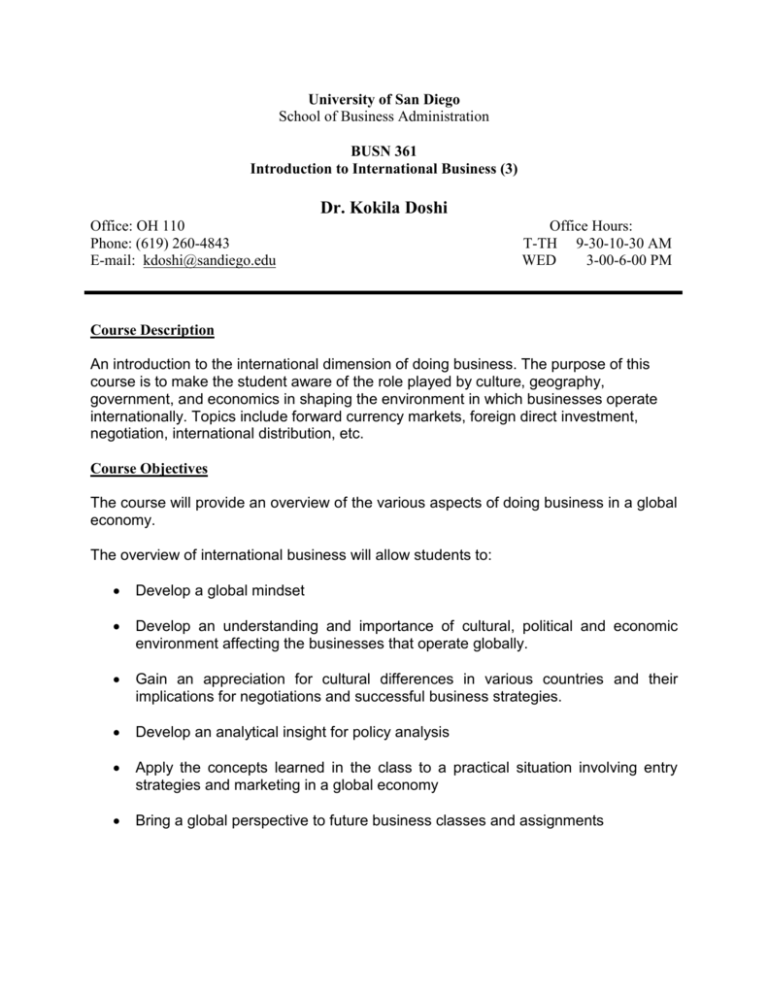
University of San Diego School of Business Administration BUSN 361 Introduction to International Business (3) Dr. Kokila Doshi Office: OH 110 Phone: (619) 260-4843 E-mail: kdoshi@sandiego.edu Office Hours: T-TH 9-30-10-30 AM WED 3-00-6-00 PM Course Description An introduction to the international dimension of doing business. The purpose of this course is to make the student aware of the role played by culture, geography, government, and economics in shaping the environment in which businesses operate internationally. Topics include forward currency markets, foreign direct investment, negotiation, international distribution, etc. Course Objectives The course will provide an overview of the various aspects of doing business in a global economy. The overview of international business will allow students to: Develop a global mindset Develop an understanding and importance of cultural, political and economic environment affecting the businesses that operate globally. Gain an appreciation for cultural differences in various countries and their implications for negotiations and successful business strategies. Develop an analytical insight for policy analysis Apply the concepts learned in the class to a practical situation involving entry strategies and marketing in a global economy Bring a global perspective to future business classes and assignments Course Material Textbook: International Business: Competing in the Global Marketplace, Charles Hill, Irwin/McGraw Hill, 8th Edition,. Handouts: To supplement the textbook, case studies and articles on current events will be distributed periodically in the class. Videos: Videos for various countries will be shown. Course Format Lectures will be used to expand upon text material. Other methods will include case studies, group discussions and debates. Based on availability, guest speakers will be invited. Class participation is highly encouraged. Discussions will include current events. For effective participation and meaningful contribution, assigned material must be read before class. Course Evaluation Your final grade will be based on the following: Midterm Exam Assignments Case Analysis Class Participation Final Exam 25% 25% 15% 10% 25% Your class participation will be judged on the basis of attendance, participation in inclass discussions and case-analysis. Exams Exams will consist of short questions and mini cases. Exams must be taken when they are scheduled. Ten points will be deducted from your score on the make-up exam. Permission to take final exam at other than the scheduled time is almost never granted. Assignments Three short research assignments will be given during the semester covering topics from self-study, current events or as supplement exercises. Case Analysis This is a group assignment. Each group will be assigned a specific case study. Your group will present the case in a creative way answering the questions provided to you in advance. Detailed instruction will be provided during the semester. Course Conduct Regular attendance is expected. Excessive absences will affect your class participation grade. Ethical behavior is expected of all students. Acts of academic dishonesty are taken seriously and dealt with harshly. Please refer to the Graduate Bulletin Handbook for more information. Any student who copies or paraphrases another person’s material on any exam or assignment or provides unauthorized assistance will receive an ‘F’ for the course. Course Outline Date Jan 25, 27 Feb 1, 3 Assignment Globalization of Markets Globalization of Production, Globalization at GE Drivers of Globalization Globalization Debate – unemployment and human costs Differences in legal, economic and political environment Differences in Culture – Self-study Hofstede’s Model, Disney in France, Islamic Banking Cross-cultural communications and negotiations Attractiveness of a country Feb 8, 10 Chapter 1 2 3 Ethics in international business Pfizer in Nigeria Walmart in China 4 International Trade Theory - Overview Product Life-Cycle Theory Porter’s Diamond 5 Case: Google in China Feb 15, 17 Free Trade vs. Protection – Self-study GATT, World Trade Organization – Self-study Instruments of Trade Policy 6 Mid-Term Exam Feb 22, 24 Profiting from global expansion Cost reductions and local responsiveness Strategic Choices, Business and social responsibility Case: Walmart’s Foreign Expansion 12 Mar 1, 3 Entry Strategies Timing, Scale, Modes of entry, GE’s joint venture Group discussion with specific products 14 Case: Toyota: The Rise of Global Corporation Mar 8, 10 Exporting Strategy Pros and Cons of Counter trade Growth of Counter trade 15 Case: Boeing vs. Airbus Mar 22, 24 Global Production – Country factors, technology factors, product factors. Centralizing or decentralizing? Make or Buy? Role of foreign factories, outsourcing – pros and cons 16 Mar 29, 31 Global Marketing Product, Place, Promotion, Pricing Role of Cultural Factors Dove: Unilever’s global brand 17 Overview & Self-study Case: Starbuck’s Corporation Apr 5, 7 Foreign Direct Investment – Growth and Direction FDI in China Benefits and costs of FDI to home and host countries (role play) 7 Case: Ikea-Lessons Learned Apr 19 Foreign Exchange Markets – Volkswagen’s Hedging Policy Exchange Rate Determination Fixed vs. Flexible Exchange Rates Currency Crisis & Role of IMF – Self-study Financial Crisis – Argentina, Greece Apr 26, 28 Currency management, current events May 3, 5 Regional Trading Groups EU, NAFTA, ASEAN, Others Martin’s textile – A response to changing wages Course Overview & Summary Course Review Apr 12, 14 May 10 May 13 - 19 Final Exam This is a tentative outline. Changes may be made as deemed necessary. 10, 11 9 Overview & Self-study
